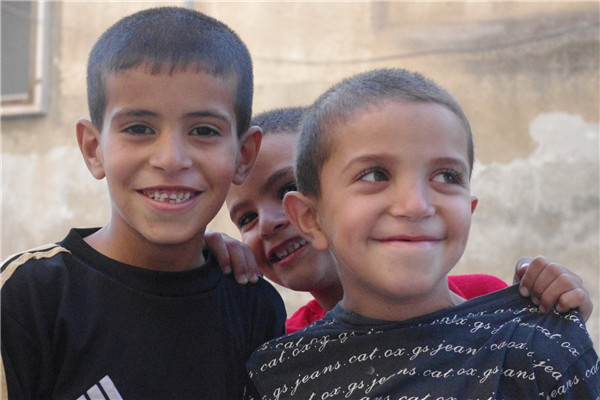Life in the West Bank behind the wall
By Peng Yining ( China Daily ) Updated: 2015-11-07 08:05:19
 |
|
Young inhabitants of Jalazone, the refugee camp 7 kilometers north of Ramallah that covers 25 hectares.[Photo By Peng Yining/China Daily] |
I lost count of how many checkpoints we passed through, but I remember that when we approached one, just seeing the barrier ahead sent my worry levels soaring. This wall was even higher and wider than the last one I had seen.
Sleepy Ramallah, with a population of just 27,000, stands in stark contrast to bustling Jerusalem, and with few imposing buildings or edifices to speak of. In fact it reminded me of any number of colorless counties I have come across in the furthermost reaches of Southwest China.
The streets were all but deserted and one of the few cars I did see sported an emblem of the United Nations.
The person who picked me up was a middle-aged man who invited me to his house for dinner. He then took me on a tour of Jalazone, a refugee camp 7 kilometers north of Ramallah that covers 25 hectares. Camp officials quoted by Agence France-Presse in April said 14,000 people live there.
We visited several local families. People were friendly and curious. It seemed to me that for them I was an amazing oriental oddity. Children were chasing me and posed for photos with me, this woman from China, land of plastic sandals and no doubt myriad other cheap goods. On almost every street groups of teenage boys huddled and talked in low voices as they eyed this strange-looking being.
They were like what I think of as confused high school boys I see in China: Dyed hair, earrings, tight-fit jeans, and smoking. In fact it set me wondering whether all these items are part of a universal uniform for boys about that age.
My guide told me that more than half those of working age in the camp are unemployed, and given that more than half the population is aged 25 or less, it is obvious that many of those jobless will be youths.
After the half-day visit to the refugee camp, my generous guide insisted on escorting me back to the bus station and waiting with me until the bus arrived. However, after he left, the bus driver announced that there had been some kind of commotion at one of the checkpoints, so bus services had been suspended.
Those who had been waiting to board the bus showed a mixture of annoyance and frustration.
To get back into Jerusalem from Ramallah you need to show a passport, and as my anxiety rose, my thoughts turned to my friend's concern for me, and I touched my chest pocket for reassurance that I had my passport with me.
It was getting dark, and as in most desert areas, the temperature can fall very quickly.
But now what should I do? Call my guide and get him to come back, knowing that because he had just spent half the day trying to convince me what a place of peace this was, my predicament could be highly embarrassing for him?
Perhaps my anguish was beginning to show, because one of the passengers, a young woman, came over to me and suggested we use private transport to get to the checkpoint, then walk through to the other side and take a bus from there to Jerusalem.
I agreed, and we both got into a van with four or five other passengers, each of us paying the driver six shekels ($1.50). Even in the low light of dusk, and through the blanket of scarves that hid this kind woman's face, her eyes sparkled. She lived in Jerusalem, she said, but traveled to the West Bank once a week to teach English to children.
Suddenly there were two loud bangs. Even before I had time to register that these must have been gunshots, passengers in the van shut all the windows, with such speed that suggested they had been through something like this before or had been trained for situations like this.
- Palestinian dies, another injured as tensions increase in West Bank
- Mother of killed West Bank toddler dies of her injuries
- Suspects arrested following deadly West Bank arson
- Missing Israeli feared kidnapped found alive in West Bank
- A large scale light festival kicks off in the west bank of Xiangjiang River of Changsha on Feb 14
|
|
|
|
|
|
|
|

























 Raymond Zhou:
Raymond Zhou: Pauline D Loh:
Pauline D Loh: Hot Pot
Hot Pot Eco China
Eco China China Dream
China Dream China Face
China Face






